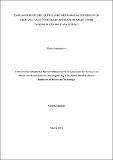| dc.description.abstract | The study has evaluated the dielectric and mechanical strength of high voltage porcelain insulators made from Tanzania local ceramic raw materials. The ceramic raw materials involved were; Pugu Kaolin Same clay, vermiculite, and feldspar. The chemical, mineralogical phases and microstructural characterization of the ceramic raw materials was carried out using the X-ray fluorescence (XRF), X-ray diffraction (XRD), and Scanning electron microscopy (SEM) techniques respectively. The XRF characterization revealed that vermiculite deposit has a higher content of hematite (Fe2O3) compared to other three deposits. Its use for porcelain insulators production can be ruled out unless it is beneficiated as it may affect the composition of the glassy phase at high firing temperature.
The X-ray diffraction (XRD) patterns of the raw materials showed that Pugu kaolin and Same clay contain mineral clay kaolinite, quartz and tridymite. Kaolinite is a source of alumina while quartz, and tridymite are sources of silicon dioxide (SiO2) whereas with fluxing oxides (K2Oand Na2O) promote the formation of glassy and mullite phases during the sintering process. Both phases promote densification and vitrification which improve the mechanical and dielectric properties of porcelain insulators.
The porcelain samples were made by varying the composition of Pugu kaolin, Same clay, vermiculite, and feldspar. Sixteen porcelain samples with dimensions 160 mm x 40 mm x 10 mm were fabricated by using the dry pressing method. The dried rectangular samples were sintered at 1200 to 1250 °C for 1.5 hrs at the ramp rate of 100C/min. The SEM micrographs showed the progressive change in densification of the porcelain samples during sintering process confirming that densification took place at 12500C. The mechanical and dielectric strength of each porcelain sample was investigated. The porcelain sample with composition, 20 wt% Pugu kaolin, 20 wt% Same clay, and 20 wt% vermiculite and 40 wt% feldspars sintered at 12500C gave the highest dielectric strength of 61.3 kV/mm, bending strength of 30.54 MPa and low water absorption value of 0.36% which satisfied the main requisite properties for high voltage porcelain insulators production. The study showed that, a high-quality high voltage porcelain insulator can be achieved from locally sourced ceramic raw materials from Tanzania. | en_US |

